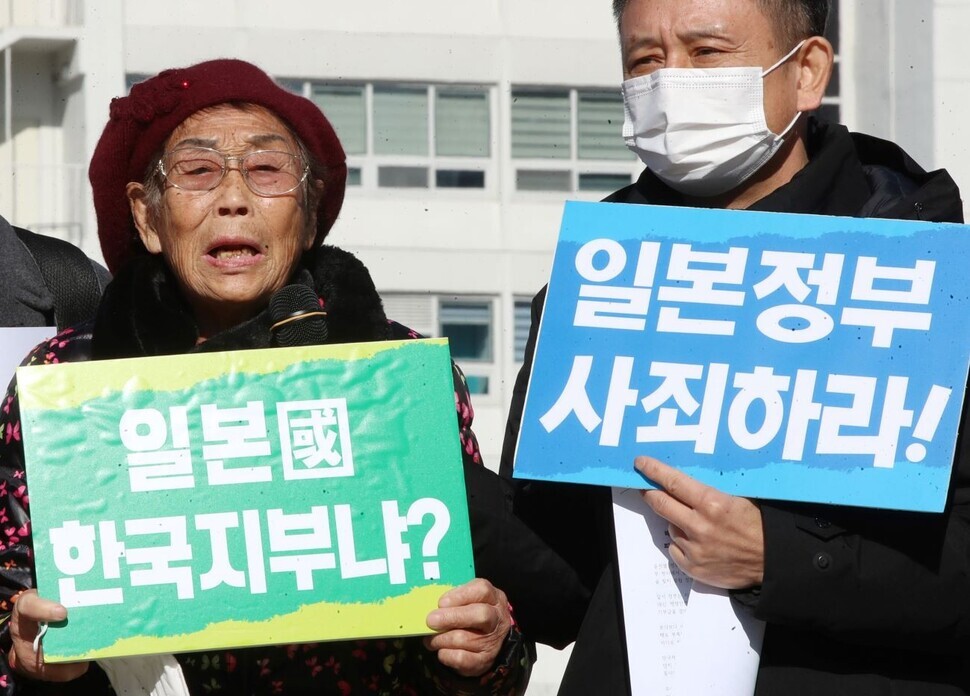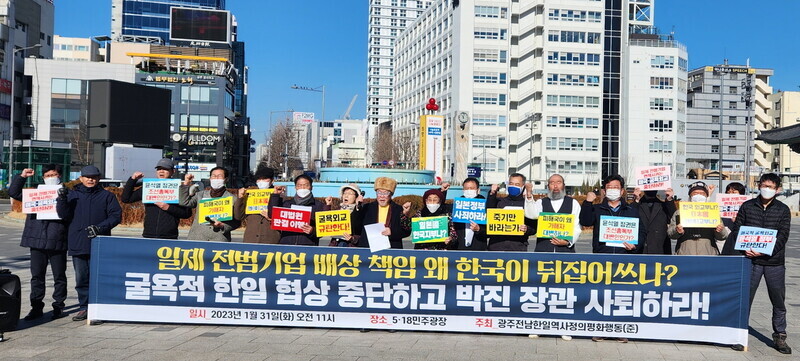hankyoreh
Links to other country sites 다른 나라 사이트 링크
Korean money can’t pay for Japanese war crimes, cries forced labor victim

“Is this really the South Korean Ministry of Foreign Affairs, or is it the Japanese one?”
Fervent chants rang out across the May 18 Democracy Square in Gwangju on Tuesday morning, as a rally gathered to blast the South Korean government’s approach to resolving the issue of compensation for victims of Japan’s forced labor mobilization.
Yang Geum-deok, a 93-year-old survivor of forced mobilization during the Japanese occupation, took part in a press conference that day with the Gwangju-South Jeolla branch of the group Action for Historical Justice and Peace, which includes 21 groups from the Gwangju and South Jeolla region.
During the press conference, they reiterated their opposition to Seoul’s plans to use funds from South Korean businesses to provide compensation to victims on behalf of Japanese companies implicated in war crimes.
Advocates organized the event after learning about the failure to find common ground on the labor mobilization issue during a meeting of officials from the South Korean and Japanese foreign ministries at the Ministry of Foreign Affairs complex in Seoul a day earlier.
“I would sooner starve to death than accept money from South Korea,” Yang said.
“I went to Japan and suffered there, and I should rightly receive the money from Japan. I can’t tell if the government and president are representing Japan’s side or ours,” she added.
“They must drop their charade,” she said.
Kim Sun-heung, director of the Gwangju branch of the Center for Historical Truth and Justice, said, “Yang Geum-deok lives in a one-room apartment that is falling apart, and even so she says that she will not accept compensation until Japan kneels down and apologizes.”
“Yet our government treats her as if she’s begging for money,” he added.
“It’s lamentable when we have this kind of situation, where they are trying to destroy an old woman’s last vestiges of pride,” he said.

In a statement delivered at the press conference, the groups said, “Even after the Supreme Court, the Republic of Korea’s highest court, issued an order for the war crime company Mitsubishi and other Japanese defendants to pay compensation, the companies in question haven’t so much as blinked an eye for the five years since the ruling.”
“Far from demanding execution of the judgment, our government has been bowing and scraping before Japan and asking it for a ‘good-faith response,’” they added.
“To top it all off, the Japanese government is demanding that the victims sign statements forfeiting their indemnity rights, while working to register the Sado mines, a site of forced Korean labor mobilization associated with Mitsubishi, as a UNESCO Industrial Heritage site,” they said.
“The Yoon Suk-yeol administration must stop at once with this ‘begging diplomacy’ approach, which not only tramples on the nation’s pride and insults the victims but will also incur the mockery of the world,” they urged.
As a 13-year-old in 1944, Yang was mobilized to work at a Mitsubishi Heavy Industries aircraft factory in Nagoya. After Korea’s liberation, she returned without having been paid for her work.
In October 2012, she and four other victims filed suit in a South Korean court to claim damages from Mitsubishi. In November 2018, they won a final victory before the Supreme Court.
Amid Mitsubishi’s ongoing refusal to respond, the plaintiffs went through legal procedures to seize and liquidate trademark rights and other company assets in South Korea. They had been awaiting a judgment from the Supreme Court.
The final ruling has been delayed since July 2022, when Seoul’s Ministry of Foreign Affairs submitted an opinion to the Supreme Court stating that it was “working toward a solution.”
At an open discussion on Jan. 12 of this year, the South Korean government triggered an outcry from victims when it officially stated plans for an approach where the Ministry of the Interior and Safety-affiliated Foundation for Victims of Forced Mobilization by Imperial Japan would pay the victims in lieu of the actually implicated Japanese companies by collecting donations from South Korean businesses and others.
By Kim Yong-hee, Gwangju correspondent
Please direct questions or comments to [english@hani.co.kr]

Editorial・opinion
![[Guest essay] Maybe Korea’s rapid population decline is an opportunity, not a crisis [Guest essay] Maybe Korea’s rapid population decline is an opportunity, not a crisis](https://flexible.img.hani.co.kr/flexible/normal/500/300/imgdb/original/2024/0430/9417144634983596.jpg) [Guest essay] Maybe Korea’s rapid population decline is an opportunity, not a crisis
[Guest essay] Maybe Korea’s rapid population decline is an opportunity, not a crisis![[Column] Can Yoon steer diplomacy with Russia, China back on track? [Column] Can Yoon steer diplomacy with Russia, China back on track?](https://flexible.img.hani.co.kr/flexible/normal/500/300/imgdb/original/2024/0430/1617144616798244.jpg) [Column] Can Yoon steer diplomacy with Russia, China back on track?
[Column] Can Yoon steer diplomacy with Russia, China back on track?- [Column] Season 2 of special prosecutor probe may be coming to Korea soon
- [Column] Park Geun-hye déjà vu in Yoon Suk-yeol
- [Editorial] New weight of N. Korea’s nuclear threats makes dialogue all the more urgent
- [Guest essay] The real reason Korea’s new right wants to dub Rhee a founding father
- [Column] ‘Choson’: Is it time we start referring to N. Korea in its own terms?
- [Editorial] Japan’s rewriting of history with Korea has gone too far
- [Column] The president’s questionable capacity for dialogue
- [Column] Are chaebol firms just pizza pies for families to divvy up as they please?
Most viewed articles
- 1Under conservative chief, Korea’s TRC brands teenage wartime massacre victims as traitors
- 2[Guest essay] Maybe Korea’s rapid population decline is an opportunity, not a crisis
- 3Value of Korean won down 7.3% in 2024, a steeper plunge than during 2008 crisis
- 4[Column] Can Yoon steer diplomacy with Russia, China back on track?
- 5Two factors that’ll decide if Korea’s economy keeps on its upward trend
- 6First meeting between Yoon, Lee in 2 years ends without compromise or agreement
- 7Months and months of overdue wages are pushing migrant workers in Korea into debt
- 8‘We must say no’: Seoul defense chief on Korean, USFK involvement in hypothetical Taiwan crisis
- 9After election rout, Yoon’s left with 3 choices for dealing with the opposition
- 10Why Kim Jong-un is scrapping the term ‘Day of the Sun’ and toning down fanfare for predecessors